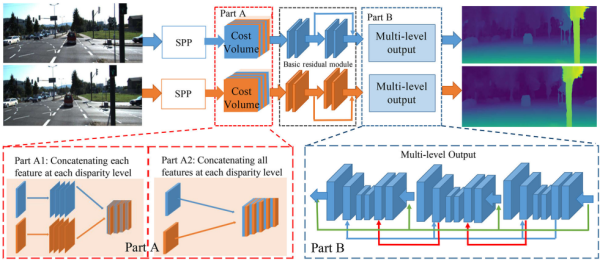
In autonomous driving, stereo vision-based depth estimation technology can help to accurately estimate the distance of obstacles, which is crucial for correct path planning of the vehicle.
The stereo depth estimation problem has been formulated into a deep learning model with convolutional neural networks. However, these models need a lot of post-processing and do not have strong adaptive capabilities to ill-posed regions or new scenes. In addition, due to the difficulty of labeling the true ground depth for real circumstances, training data for the system is limited.
A research team led by Dr. ZHANG Qieshi from the Shenzhen Institutes of Advanced Technology (SIAT) of the Chinese Academy of Sciences has proposed a new technical solution to address the current depth estimation for autonomous driving.
The researchers proposed a self-improving pyramid stereo network that can get a direct regression disparity without complicated post-processing and is robust in ill-posed area.
Moreover, by online learning, the proposed model could not only address the data limitation problem but also save the time spent on training and hardware resources in practice. At the same time, it has the self-improving ability to new scenes, which could quickly adjust in time according to test data and improve the accuracy of prediction.
Experiments and benchmark testing have demonstrated that the proposed network could achieve depth estimation with an error rate of 8.3%.
The study was published in IET Intelligent Transport Systems.

Structure of the proposed model, SPP represents for Spatial Pyramid Pooling (Image by SIAT)

86-10-68597521 (day)
86-10-68597289 (night)

52 Sanlihe Rd., Xicheng District,
Beijing, China (100864)

